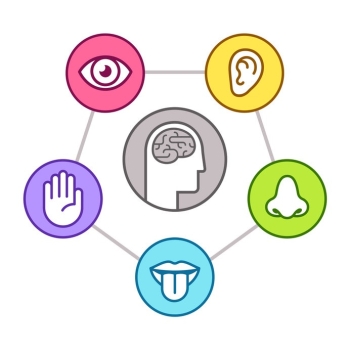
Sensory Processing Disorder (Hyper Sensitivity) in Adults and Post COVID-19
What is Sensory Processing Disorder (SPD)?
A Sensory Processing Disorder is how your senses (Hear, Smell, Taste, Touch, & See) affects how your brain processes the stimuli. SPD can manifest itself in small triggers in your environment that can cause you to feel overstimulated.
What is Sensory Modulation Disorder (SMD)?
A Sensory Modulation Disorder affects sensory processing across single or multiple sensory systems. The sensory over-responsivity (SOR) subtype of SMD is manifested clinically as a condition in which non-painful stimuli are perceived as abnormally irritating, unpleasant, or even painful.
How do I know I have SPD?
COVID-19 & SPD’s
Due to COVID-19, everyone is mandated to be quarantined. For individuals with Sensory Processing Disorders, this may have allowed you to control your environment and stimuli. We all have begun to feel comfortable in our own space. There are comforting materials within the house, relaxing smells, familiar foods, and control the noise level. As everyone is getting ready to transition back into the world, there can be a lot of stimuli that can cause dysregulation.
Here are some tips to help you transition back into society:
Self-Advocacy
As everyone is excited to be back outside, back to work, and can slowly reunite with family and friends, your social partners could have forgotten some of your sensory processing needs. REMIND THEM! If your friends want you to come over for a COVID-19 compliant gathering, but you may not be able to take all of the noise, TELL THEM NO! Ease your way back into society. Allow yourself to transition back to the fast-stimulating world slowly.
Easier said than done, right? How can we “remind” our family and friends if we have difficulty speaking up? Firstly, try incorporating what you already know about yourself as you explore what new sensory stimuli may bother you. For example, what was your preference for others to hug you before COVID-19? How may you react to hugs during COVID-19? Here is a quick sensory checklist that you can work through to explore and learn about your sensory needs.
Auditory/Hearing: How do you feel about loud sounds? Being outside with constant noise?
Vision: Being in a visually “busy” space such as parks, concerts, and restaurants?
Touch: How would you feel if someone would hug, kiss, or hold your hand?
Taste & Smell: Do you like the smell of perfume, cologne, or food i.e. a restaurant?
Next, remember your likes and dislikes in your environment. If speaking up may be difficult for you, here are some other techniques to help you explain to others what you need.
Gather your thoughts and Information: Learning and understanding your sensory needs can help you explain or clarify to others what you need. Take time out to reflect on your day-to-day experiences pre & post COVID-19. Compare them. Take note of what is a new sensory need.
Write it down: Try writing a letter or jotting down sensory inputs that can bother you. You can even try to explain why certain textures, noise, etc. may bother you. Writing them down can be a great alternative if you do not want to explain your needs! It is also great for crucial points to stay on track if you are verbalizing your needs.
Assert yourself when needed: Being assertive may be hard for some people. When in need, please SPEAK UP, and let your voice be heard. It can be harder for you to deal with the sensory trigger than to speak it. This is where saying “NO” is okay.
THIS IS YOUR NEED! YOU GOT THIS! Be gentle and gracious with yourself. Transitioning back to society after a year of controlling your environment and sensory inputs will be a rocky road. Believe that things will get better.
*If you want tips on learning and understanding your communication style and improving your self-advocacy, check out this article!
https://www.thecenterforgrowth.com/tips/exploring-your-communication-style
You can self schedule an in-person or virtual therapy session at the Center for Growth by calling (215) 922- LOVE (5683) x 100.
Our Guarantee: If after your first session you are not sold that you are working with the right therapist, do not hesitate to call our intake line at 215 922 5683 x 100 or Alex at (267) 324-9564 and ask to be rescheduled with another therapist. The choice of how you want to proceed is yours. Our only goal is to support you in becoming the best you possible.
For your convenience, we have brick and mortar offices and work with clients virtually in Connecticut, Delaware, Florida, New Jersey, New Mexico, Pennsylvania, and Virginia.
Physical Therapy Office Locations:
Ocean City Therapy Office 360 West Ave, Floor 1, Ocean City, NJ 08226
Mechanicsville Therapy Office 9044 Mann Drive, Mechanicsville Virginia, 23116
Society Hill Therapy Office 233 S. 6th Street, C-33, Philadelphia PA 19106
Art Museum / Fairmount Therapy Office 2401 Pennsylvania Ave, Suite 1a2, Philadelphia PA 19130
Providence Therapy Office 173 Waterman St. Providence, RI 02906
Fayetteville Therapy Office 101 Devant Street #606, Fayetteville GA 30214
Santa Fe Therapy Office, 2204 B Brothers Road, Santa Fe, New Mexico, 87505
Telemedicine Therapy Locations: We have therapists who are licensed to work in Connecticut, Delaware, Florida, Georgia, New Jersey, New Mexico, Pennsylvania and Virginia and Pennsylvania
Therapy Services Offered in Fayetteville, Ocean City, Mechanicsville, Philadelphia, Providence, Santa Fe:
Individual Counseling and therapy
Couples Counseling and marriage counseling
Teen Therapy and Adolescent Therapy and tweens and child counseling
Family Therapy and multi-generational counseling
Art Therapy and Counseling no art skills needed
ADHD Therapy and ADD, Dyslexia, Autism, Tourettes counseling
Anxiety, Panic, OCD Therapy and worry and fear support
Breaking the cycle of Codependency and being your own person
Overcoming Chronic Illness and Chronic Pain .
Depression Therapy and sadness, gloom, and upset support
Functional Neurological Disorder (FND) Therapy is a particular style of therapy designed for people with problems affecting their nervous system, how the brain and body send and receive signals.
Grief Therapy and loss, End of A Relationship, rejections, pregnancy and loss and therapy
Mindfulness Based Therapy and spirituality based therapy
Narcissistic Abuse Recovery child of, parent of, spouse of, sibling of a narcissist.
Sex Therapy and sexual function & dysfunction, sex addiction, sexual orientation and gender identity support
Trauma Therapy both emotional and sexual abuse, complex trauma, PTSD counseling
Divorce support
Affairs, Infidelity, Unfaithful, Cheating counseling
Parenting therapy
Personality disorder treatments Narcissist, Borderline, Histrionic
Setting Boundaries and identifying ones own Core Beliefs
Just name some of the Mental Health issues that we work with. Our goal is to help you Change and Achieve Your Dreams






















